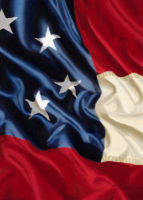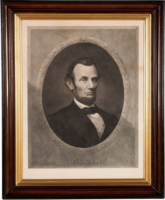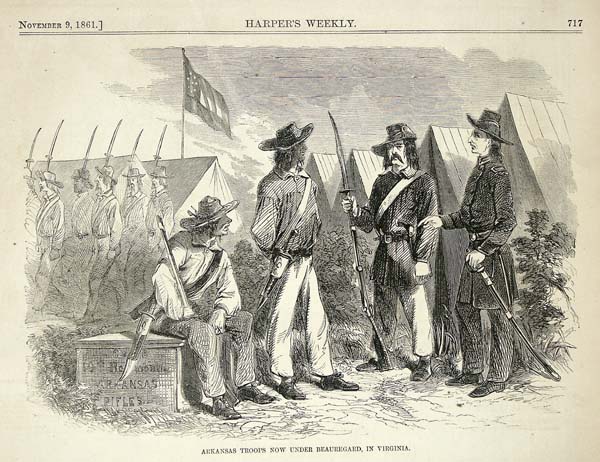“It was necessary to put the South at a moral disadvantage by transforming the contest from a war waged against states fighting for their independence into a war waged against states fighting for the maintenance and extension of slavery…and the world, it might be hoped, would see it as a moral war, not a political; and the sympathy of nations would begin to run for the North, not for the South.” ~ Woodrow Wilson, History of the American People, 1902

Adopted as the first flag of the Confederate States of America by the provisional congress on March 4, 1861, and despite its official use for over two years, this flag was never formally adopted by law because it was to be used in a flag-raising ceremony within two hours of being adopted and the congress neglected to enact a flag law. It was the original “Stars and Bars” and eventually grew to 13 stars.
How many of you remember back in grade school when they would give you a sentence with a blank in it, then provide you with choices to fill in the blank correctly? I want to try something similar, except I’ll never know how you answer. So fill in the following sentence with either “federal” or “national”: In the United States the __________ government is located in Washington, D.C.
I’m sure there were a few of you who thought to yourselves that this was a stupid exercise as they both mean the same thing. Well, that’s the entire point of this exercise, because they don’t mean the same thing.
Federalism refers to a system in which distinct sovereign entities form together in a confederation with power shared by the federal and State/local governments. Each has their own distinct spheres of operation in which they exercise jurisdiction and sovereignty.
In Federalist 45 James Madison declares our system to of a federal nature as follows, “The powers delegated by the proposed Constitution to the federal government, are few and defined. Those which are to remain in the State governments are numerous and indefinite. The former will be exercised principally on external objects, as war, peace, negotiation, and foreign commerce; with which last the power of taxation will, for the most part, be connected. The powers reserved to the several States will extend to all the objects which, in the ordinary course of affairs, concern the lives, liberties, and properties of the people, and the internal order, improvement, and prosperity of the State.”
A national government, on the other hand, is a consolidation of all the component parts of a nation into a single entity with a centralized government at the head. Under a national form of government the people owe their citizenship and their allegiance to the nation.
Patrick Henry warned of the threat of our Constitution establishing a nationalist form of government in a speech he gave to the Virginia Ratifying Assembly on June 5, 1788, “I rose yesterday to ask a question which arose in my own mind. When I asked that question, I thought the meaning of my interrogation was obvious: The fate of this question and of America may depend on this: Have they said, we, the States? Have they made a proposal of a compact between states? If they had, this would be a confederation: It is otherwise most clearly a consolidated government. The question turns, Sir, on that poor little thing-the expression, We, the people, instead of the States, of America.” (My emphasis)
In a free country such as ours, where the people hold the absolute political authority or sovereignty as it is rightfully called, whenever a system of government is established by the people, they cede, or give up, a portion of their sovereignty to the government to act on their behalf.
Typically, whenever a free people establish a system of government they do so via a written constitution which outlines the shape their government shall take and the powers granted to it. As this government only acts on behalf of those who created it, and its power and authority is derived from them, if this government should overstep the limits to its powers, its acts become breaches of the trust granted it, and the government forfeits all power and authority, which then devolves back to those from whence it originated.
By the end of the American Revolution each State had written their own constitution, establishing their own system of government to act on behalf of the citizens of each State. Each State was, for all intents and purposes, a nation unto itself. This was a fact which was recognized by the Colonists and the Crown in the Treaty of Paris, 1783, “His Brittanic Majesty acknowledges the said United States, viz., New Hampshire, Massachusetts Bay, Rhode Island and Providence Plantations, Connecticut, New York, New Jersey, Pennsylvania, Delaware, Maryland, Virginia, North Carolina, South Carolina and Georgia, to be free sovereign and Independent States…“
These sovereign and independent States had bound themselves together in a confederation, a loose union of States working together for certain specific purposes which benefited the whole. The power given to the Congress by the Articles of Confederation extended only to that which affected the interaction and intercourse between the States, also while providing for the common defense of all.
When our constitution was written, those sent to the convention which produced it had only been granted the authority by their State Legislatures to amend the Articles of Confederation, nothing more. Their task was to come up with proposals that would strengthen the existing Congress and give it the authority to enforce whatever laws it might pass, not trash the whole system and build upon its ashes an entirely new, much stronger system of government.
From a purely legal standpoint, the government we currently have was created by fraud and enacted by illegal means. As I just said, the delegates to the Philadelphia, or Constitutional Convention, clearly overstepped their authority by writing the Constitution. This breach of authority was such that Robert Yates and John Lansing, delegates from New York, departed the convention early in protest.
Upon completion of the constitution, it was merely a proposal; none of its provisions having been approved by either the State Legislatures or the people. How is it then that it could be ratified by terms found within it, and not what the Articles of Confederation said in regards to amending them, “…nor shall any alteration at any time hereafter be made in any of them; unless such alteration be agreed to in a Congress of the United States, and be afterwards confirmed by the legislatures of every State.”
Yet our Constitution went into effect when only 3/4 of the States had agreed to it, and the government it outlined was shortly thereafter put into action. Tell me, how was that legal by any definition of the word?
Not only was the Constitution not agreed to unanimously, it was never voted upon by the Congress, never sent to the State Legislatures for a vote, it was ratified by assemblies drawn from the whole mass of the people; hence the warning from Patrick Henry I mentioned a bit earlier.
Regardless of the criminal, or at least, questionable means by which our constitution was written and ratified, it is commonly accepted that it went into effect and is the Supreme Law of the Land. Nothing about the process by which it became the Supreme Law of the Land changes the nature of what this constitution is; a delegation of authority to a governing body to act on behalf of those it represents, for specific purposes. Nothing changes the fact that if the government this constitution created oversteps it’s just authority, then the power granted it devolves to those who granted it the power in the first place.
The question then arises; did this constitution establish a federal form of government, or a national one? As it was ratified by the whole of the people, one might say it formed a national one. Yet as the States still retained their sovereignty and were represented in Congress via the Senate it could also be said to be a federal one. As long as the government created by this constitution stuck to the specific powers defined within Article 1, Section 8, and left the remainder of the power to the States or the people, (See the 10th Amendment), then the government created by the constitution could be said to have been a federal one.
Yet prior to its ratification, in Federalist 48, James Madison declared that, “It will not be denied, that power is of an encroaching nature, and that it ought to be effectually restrained from passing the limits assigned to it.” Once people are given power over the lives and fortunes of others, it is a mighty temptation not to seek to expand that power. I believe it was Lord Acton who said, “Power tends to corrupt and absolute power corrupts absolutely.”
It was not unexpected then that the government created by this constitution would seek to expand its power and overstep the limits placed upon it. In fact, it was less than a decade before this first tentative step of encroaching upon the power of the States occurred with President Adams signing the Alien and Sedition Acts.
This act was so grievous to Thomas Jefferson, Adams’ Vice President at the time, wrote the Kentucky Resolutions in response, stating, “Resolved that the several States composing the United States of America, are not united on the principle of unlimited submission to their General Government . . . . and that whensoever the General Government assumes undelegated powers, its acts are unauthoritative, void, and of no force.”
This concept is known as nullification; where a State may simply declare an act by the general government unconstitutional and refuse to see it enforced within their boundaries. As further proof that the general government created by the constitution was federal in nature, in a letter to C. Hammond, Thomas Jefferson wrote, “When all government, domestic and foreign, in little as in great things, shall be drawn to Washington as the centre of all power, it will render powerless the checks provided of one government on another, and will become as venal and oppressive as the government from which we separated ….”
These checks of one government on another that Jefferson mentioned were the checks of the State governments upon the encroaching power of the general government. In essence, Jefferson was saying when our government assumed a national form, with all power in Washington D.C., it will have abolished the federal nature of our Constitution.
Now tell me, in all honesty, does not the government we have today sound strikingly like the one Jefferson warned us about? How many laws does this general government enact which apply directly to the lives, and liberties of the people within the States; areas that, according to Madison, were to be the States responsibility?
Yet there was a time when the balance of power between the general government and the State governments was a form of detente; with the States still having sufficient authority, and will, to resist the encroachment upon their sovereignty by the general government.
In the 1830’s a little known crisis occurred; known as the Nullification Crisis. This came when the tariffs imposed by the general government upon the South were being collected, then spent on improvements on the infrastructure of the North. South Carolina was at the front of those who fought against these unjust and unfair tariffs, which not only burdened them with a large majority of the revenue which funded government, but which also protected Northern business interests at the detriment of their primary business; agriculture.
This crisis was of such a nature that, once again, a Vice President rose up, this time resigning his position as Vice President, to better help his State, (South Carolina), fight these unjust tariffs.
Before I continue I need to backtrack somewhat and discuss a bedrock principle upon which this nation was founded. Prior to 1775 you could not find a Colonist who did not consider the Crown their legitimate government, and consider themselves as British citizens. It was only when the oppressions heaped upon the Colonists became too much to bear that a Declaration of Independence was written.
The words that Jefferson put to paper are among the most definite and illuminating as they pertain to the rights of man and the nature between man and government. They also form the very bedrock principle upon which America became a free and independent nature, and should be read, and fully understood by every citizen in this country.
Therefore, I would like for you to take a moment to read, and ponder Jefferson’s words; “We hold these truths to be self-evident, that all men are created equal, that they are endowed by their Creator with certain unalienable Rights, that among these are Life, Liberty and the pursuit of Happiness. — That to secure these rights, Governments are instituted among Men, deriving their just powers from the consent of the governed, — That whenever any Form of Government becomes destructive of these ends, it is the Right of the People to alter or to abolish it, and to institute new Government, laying its foundation on such principles and organizing its powers in such form, as to them shall seem most likely to effect their Safety and Happiness. Prudence, indeed, will dictate that Governments long established should not be changed for light and transient causes; and accordingly all experience hath shewn that mankind are more disposed to suffer, while evils are sufferable than to right themselves by abolishing the forms to which they are accustomed. But when a long train of abuses and usurpations, pursuing invariably the same Object evinces a design to reduce them under absolute Despotism, it is their right, it is their duty, to throw off such Government, and to provide new Guards for their future security.” (Of course I have emphasized the pertinent quotes)
In 1861, after a long train of abuses, South Carolina had finally had enough of being governed by tyrants who represented the interests found solely in the North. They then exercised, what was widely accepted as a State’s right, to secede from a voluntary Union. They were quickly followed by six other States. It was only when Abraham Lincoln called forth for 75,000 volunteers to suppress, what he called rebellion in the Southern States, did 4 more States secede, bringing the total to 11.
History books, especially those written by modern politically correct thinkers, tell us the Civil War was fought to end slavery. That is what they want you to believe because if you knew the truth the belief that a State, or group of States, still retain the right to leave a voluntary Union; a fact which a wholly national form of government simply will not tolerate.

Abraham Lincoln: The engraver was Henry Gugler, after a painting by John H. Littlefield, printed by William Pate & Company of New York. Gugler was a vignette engraver at the Bureau of Engraving and Printing in Washington. He worked on this commission for two years and, in 1878, opened the Gugler Lithographic Company in Milwaukee. This is the largest engraving of Lincoln ever produced.
Lincoln himself, in a letter to Horace Greeley, declared that his intent was not to interfere with slavery, but to save the Union, “I would save the Union. I would save it the shortest way under the Constitution. The sooner the national authority can be restored; the nearer the Union will be “the Union as it was.” If there be those who would not save the Union, unless they could at the same time save slavery, I do not agree with them. If there be those who would not save the Union unless they could at the same time destroy slavery, I do not agree with them. My paramount object in this struggle is to save the Union, and is not either to save or to destroy slavery. If I could save the Union without freeing any slave I would do it, and if I could save it by freeing all the slaves I would do it; and if I could save it by freeing some and leaving others alone I would also do that. What I do about slavery, and the colored race, I do because I believe it helps to save the Union; and what I forbear, I forbear because I do not believe it would help to save the Union.” (August 22, 1862)
Lincoln raised an army without Congressional approval or a declaration of war. Nowhere within the Constitution does it authorize the Executive the authority to compel any State to remain in the Union should it choose to leave. In fact, in his Inaugural Address Thomas Jefferson declared it to be a State’s right to do so; however misguided their reason may be, “If there be any among us who would wish to dissolve this Union, or to change its republican form, let them stand undisturbed as monuments of the safety with which error of opinion may be tolerated, where reason is left free to combat it.”

After the Civil War ended, the leaders of the Confederacy were never brought to trial for treason or rebellion, as it would have given credence to their cause, and condemned the North. This fact was affirmed by Chief Justice Salmon P. Chase in 1867, “If you bring these [Confederate] leaders to trial it will condemn the North, for by the Constitution secession is not rebellion.”
During the Civil War the London Times compared the war to the war for independence fought by the original 13 Colonies, “[T]he contest is really for empire on the side of the North, and for independence on that of the South, and in this respect we recognize an exact analogy between the North and the Government of George III, and the South and the Thirteen Revolted Provinces. These opinions…are the general opinions of the English nation.” (London Times, November 7, 1861)
Years after the war ended, Woodrow Wilson would sit down to write his History of the American People, saying this about the Civil War, “It was necessary to put the South at a moral disadvantage by transforming the contest from a war waged against states fighting for their independence into a war waged against states fighting for the maintenance and extension of slavery…and the world, it might be hoped, would see it as a moral war, not a political; and the sympathy of nations would begin to run for the North, not for the South.”
That is not what your politically correct history text books tell you, and it is not what the politically correct members of society today say when they seek to tear down any remnant of the pride and history of those who fought America’s Second War for Independence.
The freeing of the slaves by the 13th Amendment was but a consequence of the loss of the war by the South, but it was not the reason the war was fought. The reason the war was fought was because the general government had shifted from a federal form to a fully national form, and under a national form all State sovereignty is relinquished to the national authority.
Why is it that today when you ask a person their citizenship status they reply not with the State they reside in, but say instead, I’m a U.S. citizen, or an American Citizen? It is because we have seen our government shift from a federal to a national one, and in a national form of government the people owe their allegiance and citizenship status to the nation, not their native State.
When I write these little commentaries of mine, okay sometimes not so little, I am often criticized for my lack of loyalty to my country and my lack of patriotism. I think the problem lies in how one defines patriotism. I do not define patriotism as unquestioned support for the actions of my government, or blind acceptance of whatever laws it might enact. Instead, I consider patriotism to be the adherence to the principles upon which this, once mighty, nation was founded.
I cannot, in clear conscience, support a government whose every act violates those principles; and it doesn’t matter if these violations are perpetrated by Republicans or Democrats. I see government as an entity created by the people with certain specific powers granted it on our behalf. If government, and it does not matter if it is controlled by Republicans or Democrats, oversteps those limits, then its actions become criminal, and in my mind, both the government, and those who support it are criminal.
You can question my patriotism all you want, all I ask is that you provide some sort of evidence to back up your claims. If you are unable to do so, then just maybe you ought to reconsider for yourself what it means to be patriotic.
And, as Forrest Gump said, “That’s all I have to say about that.”
 ~ The Author ~
~ The Author ~
Neal Ross, Student of history, politics, patriot and staunch supporter of the 2nd Amendment. Send all comments to: bonsai@syix.com.
If you liked Neal’s latest column, maybe you’ll like his latest booklet: The Civil War: (The Truth You Have Not Been Told) AND don’t forget to pick up your copy of ROSS: Unmasked – An Angry American Speaks Out – and stay tuned – Neal has a new, greatly expanded book coming soon dealing with the harsh truths about the so-called American Civil War of 1861-1865. Life continues to expand for this prolific writer and guardian of TRUE American history.

But I can assure you that the above will NOT be “all that Neal will have to say about that!“